High Protein Foods for Elderly - Senocare
Protein is an essential micronutrient. Our body, including, skin, hair, nails, hemoglobin etc. need enough amounts of it to maintain healthy body functions. From kids to older adults, it’s required across all age groups.
When we think about protein, we usually associate it with body building or weight loss. We hardly think about any other benefit it offers. Turns out, protein is extremely important for elderly. Why? As we age, we begin to lose our skeletal muscle mass and strength. This is an involuntary process called sarcopenia.
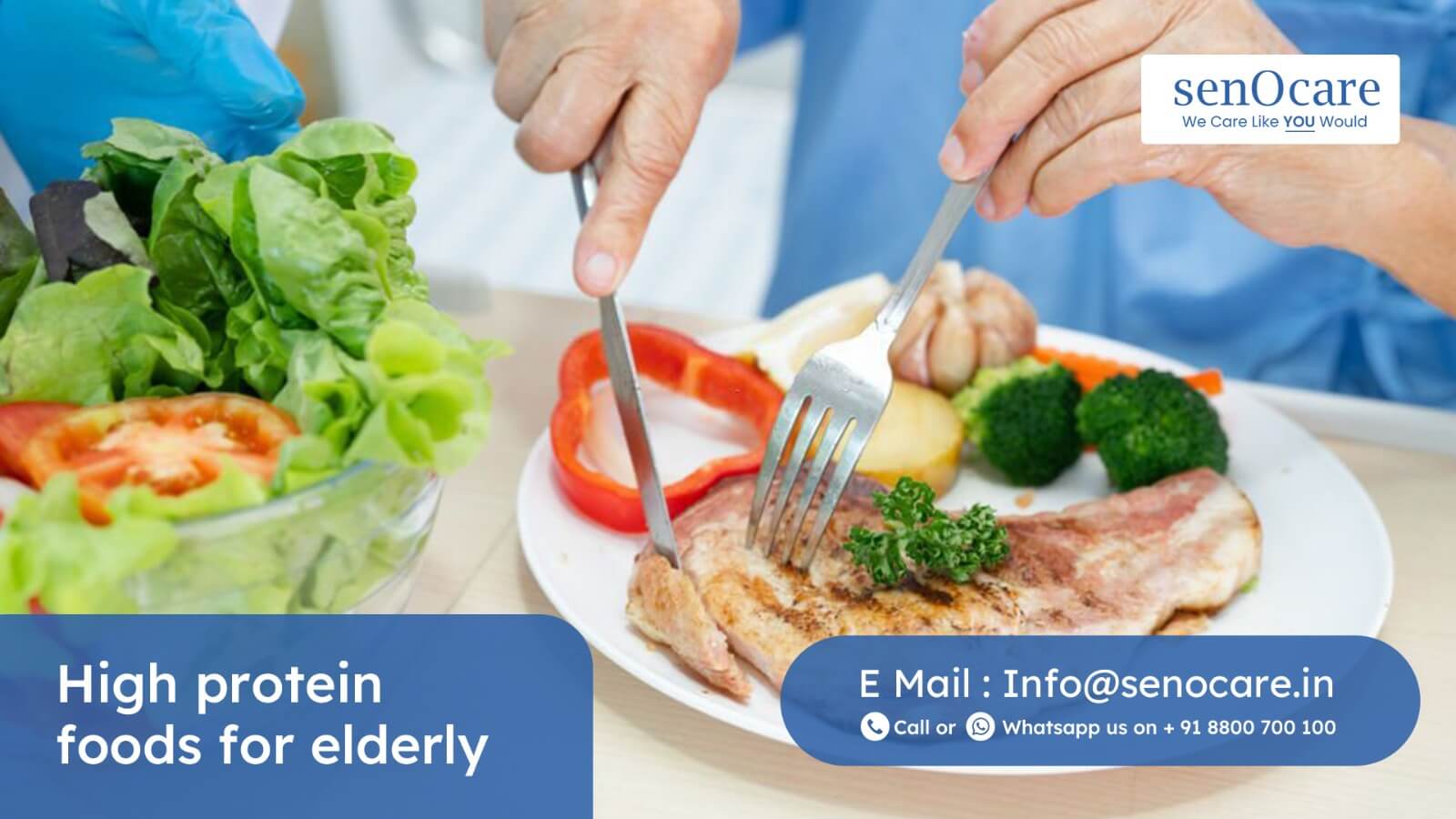
During aging, we don’t just lose muscle mass, we tend to lose strength too.1 Research suggests this can have adverse effects on the health of older adults, leading to - 2, 3, 4, 5 -
1. Disability
2. Increased risk of falling
3. Comorbidities (presence of two or more acute and chronic health conditions)
4. Rheumatoid Arthritis (chronic pain in joints)
5. Obesity
6. Development of cardiovascular diseases
Why is Protein Important for Seniors?
Protein aids in many physiological processes that are important for maintaining good health. For example, hemoglobin – which is a type of protein, helps in carrying blood across the body. Similarly, lactase and sucrase (also proteins) aid in digesting sugar. However, the most significant benefit of protein for older adults is in maintaining muscle mass and strength. Research indicates that increased intake of protein can help minimize sarcopenia in seniors 6 and help them live a physically independent life. Additionally, protein for seniors helps -
- Maintain good skin, nails, and hairs
– A major part of skin, hairs and nails is made up of protein called keratin. Including dietary protein in senior’s diet can help maintain their hair, skin, and nails.
- Manage weight
– Protein rich foods are satiating and can makeseniors full for longer, making them avoid snacking or overeating. This helps in managing weight.
- Maintain bone health
– Research shows increased intake of protein in elder adults increases calcium absorption7.
- Maintain cardiovascular functions
– Increased dietary protein intake among women shows less risk of ischemic heart diseases. 8
How Much Protein Do Seniors Need?
The Recommended Daily Allowance (RDA) of dietary protein for seniors (65 years and above) is 0.80g/kg per day, according to the Food and Nutrition Board. However, several research studies suggest higher intake of dietary protein for older adults, 1.2g/kg to 2.0g/kg per day.
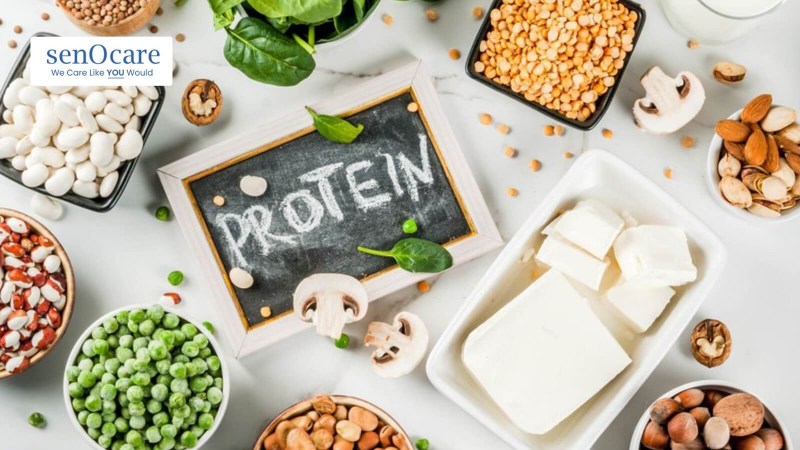
High Protein Foods for Elderly
Now that we’ve established that seniors need amounts of protein, let’s see the sources from where they can get it. There are both plant-based and animal -based sources from where older adults can get their dietary protein.
1. Eggs
Eggs are an excellent source of protein. In addition to protein, they contain other nutrients, such as choline, Vitamin A, Vitamin D, Selenium, etc. which protects against chronic diseases. Research also shows that eggs protect against sarcopenia. 9
2. Chicken breast
A chicken breast is a rich source of protein. It can contain up to 30grams (gms) of protein per 100 gms. For seniors who are non-vegetarians, it is an excellent source of protein. Other cuts of chicken, like thighs, drumsticks, etc. are also good sources of protein.
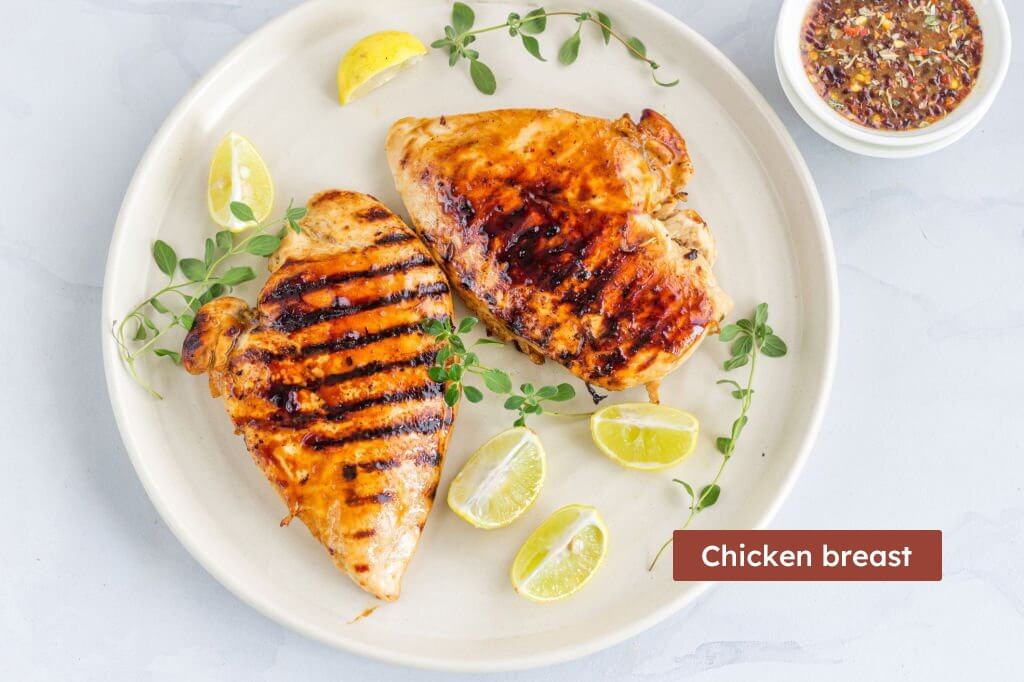
3. Black Chana (Black Gram/ Bengal Gram)
Eating overnight soaked kala chana andwhole moong is a household tradition in many Indian homes. Many seniors are used to it, but others may need a little nudge. 100 gms of black chana (or bengal gram) can contain up to 22 gms of protein. In addition to protein, black chana is also rich in fiber, containing 11 grams or more of it.
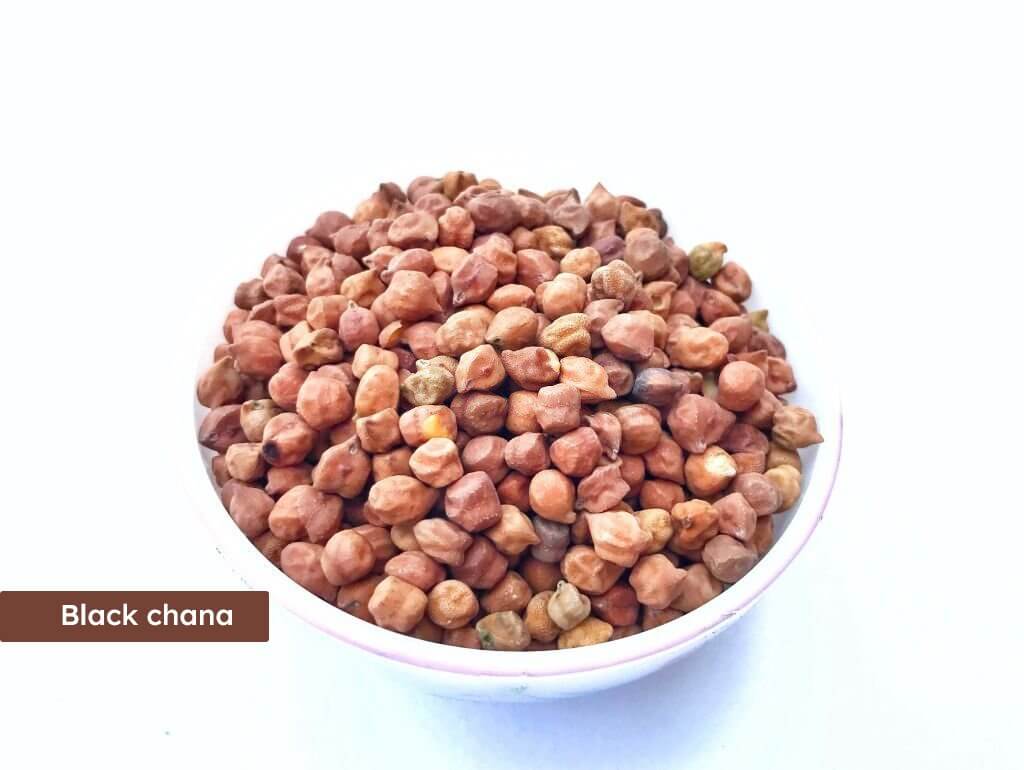
4. Sprouts
Sprouts, be it moong sprouts, fenugreek sprouts or black gram sprouts, all are good sources of protein.These plant-based foods are excellent examples of high protein food for elderly; they can be consumed as soaked or boiled. Sprouts also supply folate, omega-3, omega-6, and other essential minerals.
5.Fish
Fishes are an excellent example of high protein soft food for elderly. Though edible fishes vary in their protein content, the amount can go up to 30 gms or more in 100 gms of fish. Once cooked, baked, or grilled, they easy to chew and digest, making them an excellent source of protein for seniors. Salmon, prawns, tuna, and crab have significant quantities of protein in them.
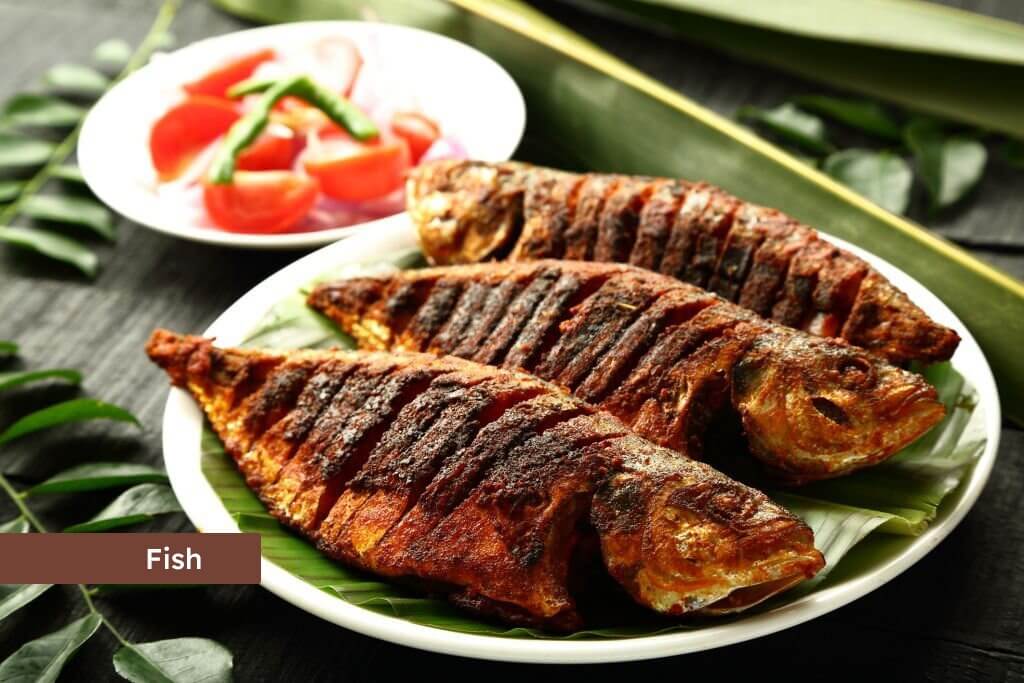
6. Cottage cheese (Paneer)
Paneer is consumed widely across India. It is relished with Indian staples. Given that paneer is derived from milk solids, it has an excellent profile of nutrients. 100gms cottage cheese can contain nearly 22gms of protein; it also contains significant amount of fats.
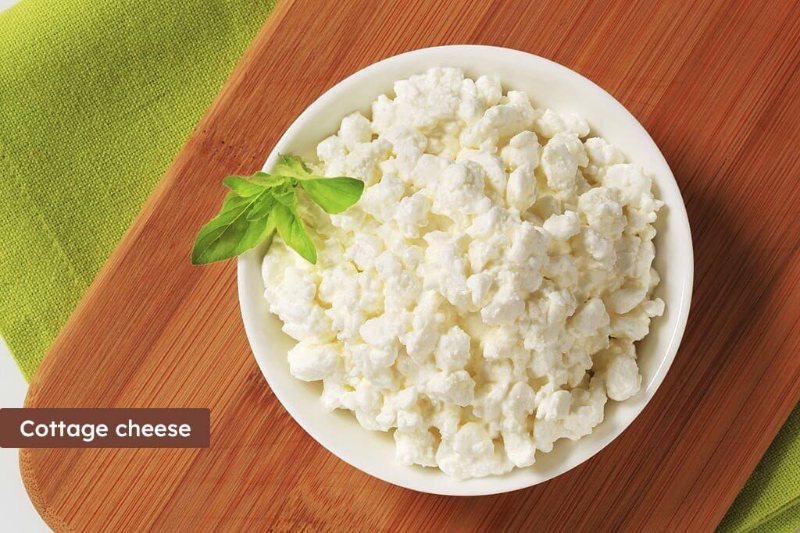
7. Almonds (Badam) and other nuts
Almonds, cashews, and pistachios are good sources of protein. 100gms of almonds contain up to 21 gms of proteins.10 Almonds and other nuts are also good sources of healthy fats and help lower the risk of heart diseases. These can be added to sprout salads and other plant-based meals.
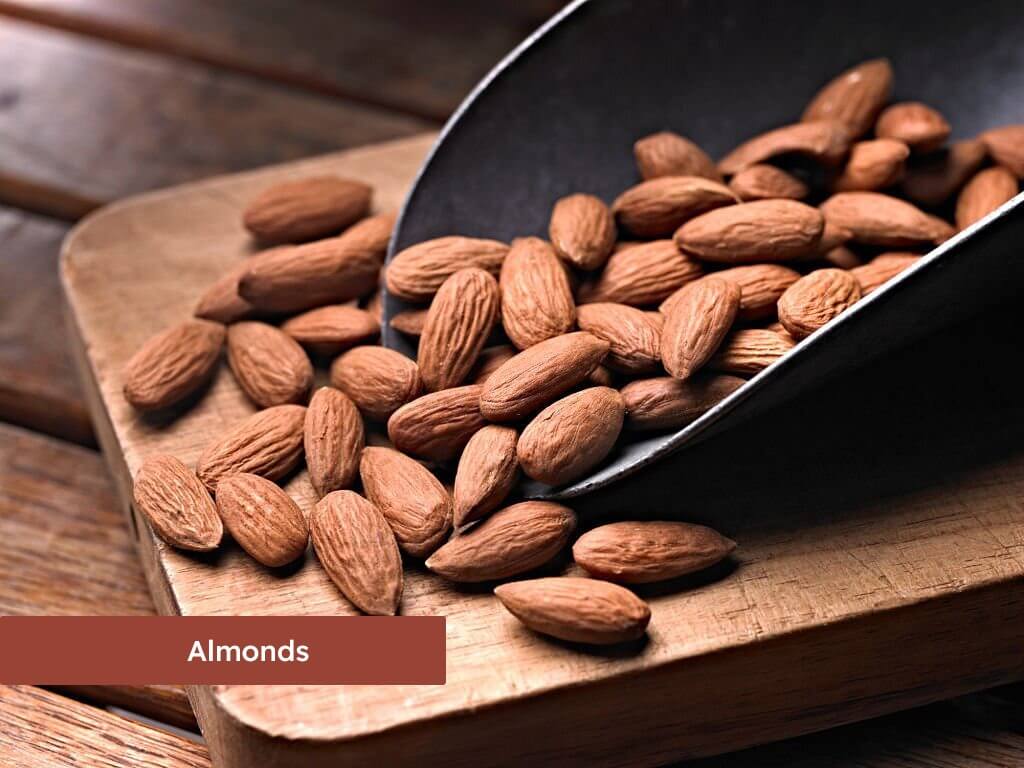
8. Peanuts and peanut butter
Peanuts are good source of protein and healthy fats. 100 gms raw peanuts can contain 25 gms of protein11, making them one of the best high protein foodsfor elderly. They can be eaten separately as snacks or added to meals such as poha, upma, etc. Peanut butter is quite popular for their high protein content in the health and wellness community and among athletes.
A scoop of peanut butter on a slice of bread can make you feel satiated and full for longer due to its high protein content.
9. Lentils (Dal)
Lentils or dal are nutritionally rich and can contain 24 gms or more protein in a 100 gms serving12. They come in various types – moong, tur, masoor, etc. All of them have
At least one meal of the day in Indian household is accompanied with dal. Usually, a dal is served with white rice or roti, but they can also be consumed separately or in other forms like a chilla (crepe) by soaking them in water and then grinding them to make crepes.
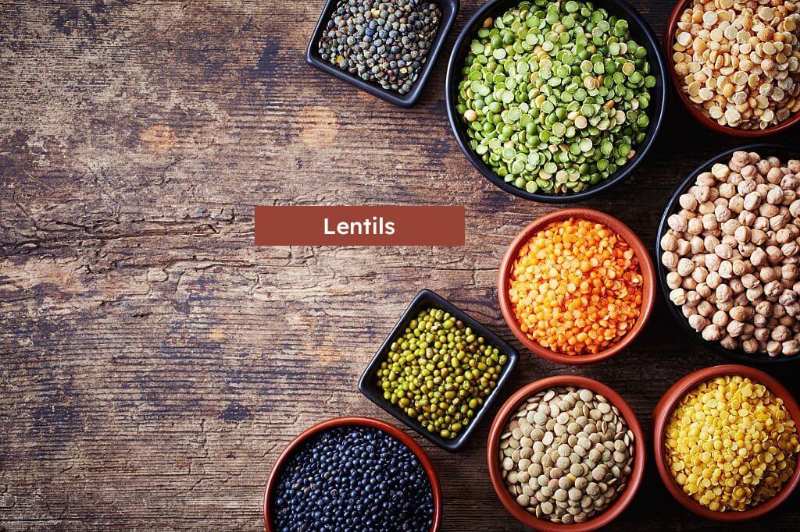
10. Edible seeds
Pumpkin seeds, flax seeds, sunflower seeds, sesame, chia seeds and many other seeds contain significant amount of protein. 100 gms of chia seeds contain nearly 16.5 gms of protein13; 100 gms of roasted pumpkin seeds contain 29.8gms of protein14, and more. Other seeds contain equally enough protein.
These seeds can be eaten as snacks or served mixed with salads, desserts, etc.
How to ensure high protein foods for elderly?
Caregivers can ensure that their elderlies are having high protein by tracking nutritional value of their meals. Including high protein foods, such as eggs, chicken breast, etc. in seniors ‘diet is an excellent way to do so. Additionally, caregivers can consult geriatric dietitian, who can create a high-protein meal plan based on the health conditions of seniors, ensuring that seniors are getting high protein diet.
FAQs
1. Are high protein foods beneficial for the elderly?
Yes, high protein diet is good for elderly as it helps them age well. However, if an elderly has a condition, geriatric dietitian must be consulted before making changes to the diet.
2. How much protein does a 70-year-old need daily?
Research shows older adults need anywhere between 0.80 -2.0 gms/kg per day of protein. So, accordingly a 70-year-old may need between 56 gms to 140 gms of protein per day.
3. How much protein does a 75-year-old need to build muscle?
Several research studies show that seniors need 0.80 -2.0gms/kg per day of protein. Going by the research, a 75-year-old may need between 56 gms to 140 gms of protein per day to build muscles.
4. What is the best source of protein for seniors?
Eggs, almonds, fishes, etc. are excellent sources of protein for seniors. They can help fulfil daily protein requirement. However, a geriatric dietician must be consulted before incorporating any protein-rich food in their meal.
5. Is protein powder okay for seniors?
Protein powder can help seniors fulfil their protein requirement. However, caregivers must consult a dietitian before taking any protein supplement, especially if they’ve a condition.
6. Can a 70-year-old take whey protein?
Whey protein can help seniors maintain muscle mass and strength. So, it’s okay for a 70-year-old to take whey protein. Different types of whey protein for seniors are available in the market. However, caregivers must consult a certified geriatric dietitian before giving any protein supplement to their elderlies.
7. Does a high protein diet help with sarcopenia?
Yes, protein-rich food helps with sarcopenia. Eggs, which are excellent source of essential amino acids (proteins) are demonstrated to protect against sarcopenia.
8. What foods help with sarcopenia?
Studies say eggs protect against sarcopenia. Other protein-rich foods like moong sprouts salmon, lean meat, chicken, etc. can also help.
References
1. https://www.ncbi.nlm.nih.gov/pmc/articles/PMC4066461/
2. https://pubmed.ncbi.nlm.nih.gov/21709116/
3. https://www.ncbi.nlm.nih.gov/pmc/articles/PMC3598358/
4. https://pubmed.ncbi.nlm.nih.gov/18512711/
5. https://pubmed.ncbi.nlm.nih.gov/27417778/
6. https://pubmed.ncbi.nlm.nih.gov/16886097/
7. https://pubmed.ncbi.nlm.nih.gov/19460090/
8. https://pubmed.ncbi.nlm.nih.gov/10426698/
9. https://www.ncbi.nlm.nih.gov/pmc/articles/PMC9316657/
10. https://fdc.nal.usda.gov/fdc-app.html#/food-details/170567/nutrients
11. https://fdc.nal.usda.gov/fdc-app.html#/food-details/170567/nutrients
12. https://fdc.nal.usda.gov/fdc-app.html#/food-details/172420/nutrients
13. https://fdc.nal.usda.gov/fdc-app.html#/food-details/170554/nutrients
https://fdc.nal.usda.gov/fdc-app.html#/food-details/170554/nutrients